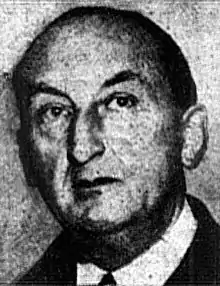Fernand de Brinon
Fernand de Brinon, Marquis de Brinon (French pronunciation: [feʁnɑ̃ də bʁinɔ̃]; 26 August 1885 – 15 April 1947) was a French lawyer and journalist who was one of the architects of French collaboration with the Nazis during World War II. He claimed to have had five private talks with Adolf Hitler between 1933 and 1937.[1]

Biography
Early life and marriage
Born into a wealthy family in the city of Libourne in the Gironde département, Fernand de Brinon studied political science and law at university but chose to work as a journalist in Paris. After the First World War, he advocated a rapprochement with Germany. He became friends with Joachim von Ribbentrop.
Ferdinand de Brinon married Jeanne Louise Rachel Franck, a.k.a. Lisette, the Jewish former wife of Claude Ullmann; she converted to Catholicism.
1930s Paris
The Brinons became leading socialites in 1930s Paris, and close friends of the political right-wing elite and of radical leader Édouard Daladier.[2] In co-ordination with Ribbentrop's personal representative in Paris, Otto Abetz, Brinon headed the France–Germany Committee, which was designed to influence France's political and cultural establishment in a pro-German direction.[3] This was Nazi Germany's main propaganda technique in their attempt to influence French politics before the Second World War.[4] During the Munich crisis, Brinon sent accounts of the discussions of the French Cabinet to the German government, obtained from two ministers.[5]
Occupied Paris
A leading advocate for collaboration following France's defeat by Germany in the Second World War, in July 1940 Brinon was invited by Pierre Laval, Vice-Premier of the new Vichy regime, to act as its representative to the German High Command in occupied Paris. Brinon seat was the confiscated Hôtel de Breteuil in Paris (12 avenue Foch). Brinon benefited from his long acquaintance with the German ambassador Otto Abetz. In September 1940 he also established the Groupe Collaboration to help establish closer cultural ties between Germany and France.[6] In 1942, Philippe Pétain, head of the Vichy regime, gave him the title of Secretary of State.
As the third-ranking member of the Vichy regime and because of his enthusiastic support for the fascist cause, Brinon's importance to the Nazis was such that he was able to obtain a special pass for his Jewish-born wife that exempted her from deportation to a German concentration camp.
Vichy government in exile
In the face of the Allied invasion of France in June 1944, the remnants of the Vichy regime fled to Sigmaringen, Germany, in September 1944 where the Germans set up the French Governmental Commission for the Defense of National Interests as a government in exile.[7] The Germans wished to project a facade of legality for the Commission, and enlisted Fernand de Brinon to serve as president, and other Vichy officials, including Joseph Darnand, Jean Luchaire, Eugène Bridoux, and Marcel Déat as members.[8]
Arrest and trial
He was eventually arrested by the advancing Allied troops. He and his wife were both held in Fresnes prison but she was eventually released.
Fernand de Brinon was tried by the French Court of Justice for war crimes, found guilty and sentenced to death on 6 March 1947.[1] He was executed by firing squad on 15 April at the military fort in the Paris suburb of Montrouge.[1]
In 2002, French historian Gilbert Joseph published Fernand de Brinon : L'Aristocrate de la collaboration. In 2004, Bernard Ullmann, Lisette de Brinon's son from her first marriage, broke his 60-year silence and told his family's story in his book, Lisette de Brinon, Ma Mère.
References
- Shirer, William L. (1971). The Collapse of the Third Republic (3rd ed.). New York: Pocket Books. p. 374. ISBN 0671785095.
- Anthony Adamthwaite, Grandeur and Misery: France's Bid for Power in Europe 1914-1940 (London: Arnold, 1995), p. 166.
- Adamthwaite, pp. 165-166.
- Adamthwaite, p. 165.
- Adamthwaite, p. 166.
- David Littlejohn, The Patriotic Traitors, Heinemann, 1972, p. 222
- Aron 1962, p. 40-45.
- Rousso 1999, p. 51–59.
Works cited
- Aron, Robert (1962). "Pétain : sa carrière, son procès" [Pétain: his career, his trial]. Grands dossiers de l'histoire contemporaine [Major issues in contemporary history] (in French). Paris: Librairie Académique Perrin. OCLC 1356008.
Mauthner, Martin: Otto Abetz and His Paris Acolytes - French Writers Who Flirted with Fascism, 1930–1945. Sussex Academic Press, 2016, ISBN 978-1-84519-784-1
- Rousso, Henry (1999). Pétain et la fin de la collaboration : Sigmaringen, 1944-1945 [Pétain and the end of collaboration: Sigmaringen, 1944-1945] (in French). Paris: Éditions Complexe. ISBN 2-87027-138-7.